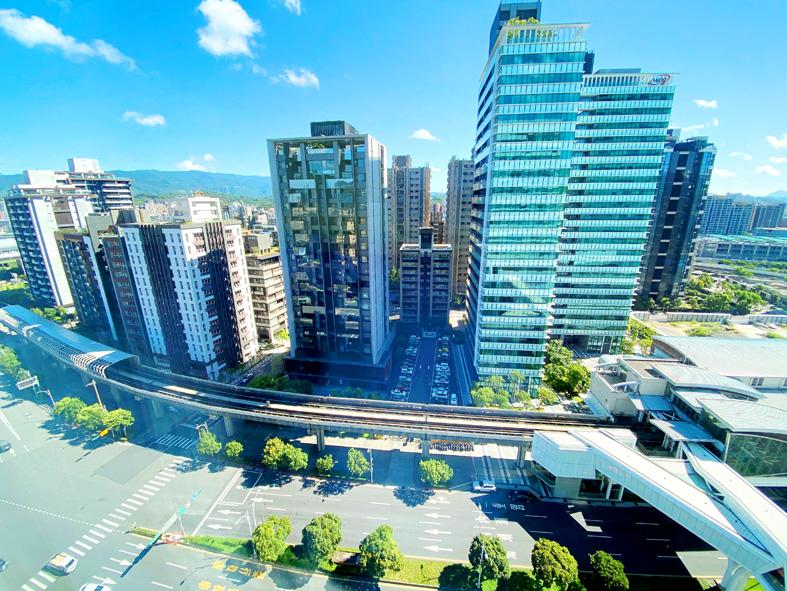Developers in northern Taiwan plan to launch NT$150 billion (US$5.39 billion) of presale and newly completed housing projects for the fall season, as the market regains some confidence amid a declining number of COVID-19 cases in Taiwan, the Chinese-language My Housing Monthly said.
Sentiment improved after the number of locally transmitted COVID-19 cases dropped to single digits this month and the government said it was planning to issue stimulus vouchers in October to reinvigorate consumer activity.
“There are nine projects with total sales exceeding NT$10 billion, indicating an evident recovery in confidence on the part of developers,” wrote Ho Shih-chang (何世昌), research manager at the publication.

Photo: Hsu Yi-ping, Taipei Times
The trend suggests that the market would gain further steam toward the end of this year, the peak season for property transactions, Ho said.
Most of the large projects are in the greater Taipei area — four in Taipei and three in New Taipei City — as the region sheds the COVID-19 hotspot label, encouraging developers to launch new projects, My Housing Monthly said.
Urban renewal projects on Dunhua N Road and Zhongxiao E Road are to dominate the market in Taipei, where the supply of land is scarce, it said, adding that a residential complex in Wenshan District (文山) aims to stimulate relocation demand to larger apartments with three and four bedrooms.
Shin Kong Life Insurance Co (新光人壽) is to release a luxury home project offering apartments of 57 ping to 68 ping (188m2 to 225m2) on Chongqing S Road in Taipei’s Zhongshan District (中山), the publication said.
Urban renewal projects accounted for two major apartment complexes in New Taipei City — in Banciao District (板橋) and Tucheng District (土城) — while rezoning accounted for a large housing project in Sindian District (新店), it said.
Town-making in Keelung drives massive residential projects with more than 1,000 apartment units that require relatively low down payments of NT$560,000, it said.
The projects in Keelung and Taipei’s Wenshan would feature second and third batches, reflecting long-term confidence on the part of developers, which seek to spur relocation demand among first-time homebuyers whose families have grown over the years, Ho said.
The developers are betting that affordability and space would take precedence over location in purchase decisions, adding that the ratio of small apartments — the mainstream product in the past few years — is falling, he said.
It remains to be seen if the strategy will prove successful, he added.

SEMICONDUCTORS: The firm has already completed one fab, which is to begin mass producing 2-nanomater chips next year, while two others are under construction Taiwan Semiconductor Manufacturing Co (TSMC, 台積電), the world’s largest contract chipmaker, plans to begin construction of its fourth and fifth wafer fabs in Kaohsiung next year, targeting the development of high-end processes. The two facilities — P4 and P5 — are part of TSMC’s production expansion program, which aims to build five fabs in Kaohsiung. TSMC facility division vice president Arthur Chuang (莊子壽) on Thursday said that the five facilities are expected to create 8,000 jobs. To respond to the fast-changing global semiconductor industry and escalating international competition, TSMC said it has to keep growing by expanding its production footprints. The P4 and P5

DOWNFALL: The Singapore-based oil magnate Lim Oon Kuin was accused of hiding US$800 million in losses and leaving 20 banks with substantial liabilities Former tycoon Lim Oon Kuin (林恩強) has been declared bankrupt in Singapore, following the collapse of his oil trading empire. The name of the founder of Hin Leong Trading Pte Ltd (興隆貿易) and his children Lim Huey Ching (林慧清) and Lim Chee Meng (林志朋) were listed as having been issued a bankruptcy order on Dec. 19, the government gazette showed. The younger Lims were directors at the company. Leow Quek Shiong and Seah Roh Lin of BDO Advisory Pte Ltd are the trustees, according to the gazette. At its peak, Hin Leong traded a range of oil products, made lubricants and operated loading

The growing popularity of Chinese sport utility vehicles and pickup trucks has shaken up Mexico’s luxury car market, hitting sales of traditionally dominant brands such as Mercedes-Benz and BMW. Mexicans are increasingly switching from traditionally dominant sedans to Chinese vehicles due to a combination of comfort, technology and price, industry experts say. It is no small feat in a country home to factories of foreign brands such as Audi and BMW, and where until a few years ago imported Chinese cars were stigmatized, as in other parts of the world. The high-end segment of the market registered a sales drop

Citigroup Inc and Bank of America Corp said they are leaving a global climate-banking group, becoming the latest Wall Street lenders to exit the coalition in the past month. In a statement, Citigroup said while it remains committed to achieving net zero emissions, it is exiting the Net-Zero Banking Alliance (NZBA). Bank of America said separately on Tuesday that it is also leaving NZBA, adding that it would continue to work with clients on reducing greenhouse gas emissions. The banks’ departure from NZBA follows Goldman Sachs Group Inc and Wells Fargo & Co. The largest US financial institutions are under increasing pressure